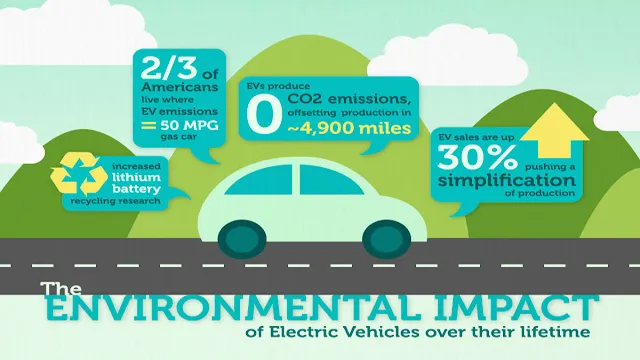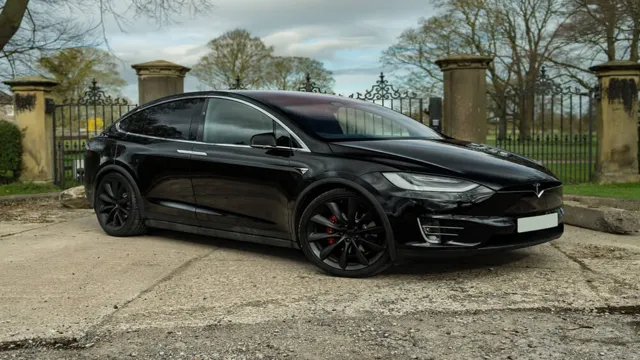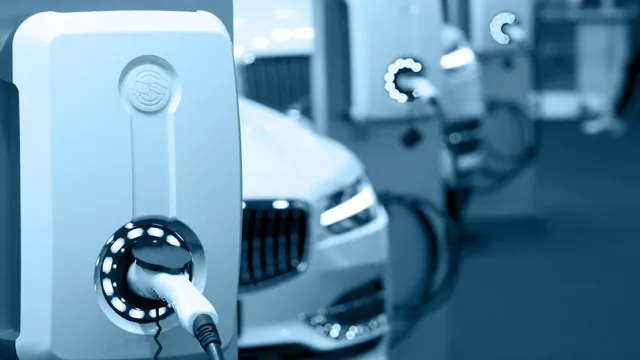Driving Green: Discovering the Environmental Benefits of Electric Cars
Electric cars have been around for some time now, and with the push towards environmental sustainability, they are becoming more popular than ever before. Electric cars are powered by electricity, which means that they don’t produce harmful emissions like traditional petrol cars do. This is a significant advantage, not only for the planet but also for those who live in urban areas, where air pollution can have a detrimental impact on health and wellbeing.
In this blog, we’ll be taking a closer look at the environmental benefits of electric cars and why they are an essential part of the fight against climate change. So, buckle up and get ready to discover how electric cars are driving us towards a cleaner, greener future!
Reduced Emissions
When it comes to the environment benefits of electric cars, one of the biggest advantages is the significant reduction in emissions. Unlike traditional gasoline-powered vehicles, electric cars don’t produce harmful tailpipe emissions that contribute to air pollution and climate change. Additionally, even when considering the emissions generated by electricity used to charge the car, electric vehicles are still cleaner than their gas counterparts.
In fact, the Union of Concerned Scientists estimates that driving an electric car produces about half the emissions of a gasoline car with an average fuel economy of 27 mpg. Ultimately, electric cars offer a sustainable mode of transportation that has the potential to help reduce emissions and protect the environment for generations to come.
Electricity generation vs. gasoline combustion
When it comes to reducing emissions, electricity generation has a clear advantage over gasoline combustion. Electricity can be generated from a variety of sources, including renewable sources such as solar and wind power, which produce zero emissions during generation. On the other hand, gasoline combustion results in the emission of harmful pollutants such as carbon dioxide, nitrogen oxide, and particulate matter.
By transitioning to electric vehicles powered by clean energy, we can significantly reduce our carbon footprint and improve air quality. It’s like switching from a dirty old coal furnace to a modern, efficient heat pump – you’ll not only save money on your energy bill but also help to protect the environment. So, let’s make the transition to clean energy today and pave the way for a better, cleaner future for ourselves and generations to come!

Impact on air quality
The reduction in carbon emissions has had a significant impact on air quality. With fewer cars on the road and reduced industrial activity, the air is cleaner and fresher. The immediate and profound impact of the pandemic on the world’s air quality was evident when lockdown measures were implemented.
The global air quality improved significantly. In India, for instance, the lockdown resulted in air quality levels that were almost 40% lower than normal levels. This is a significant improvement, considering that air pollution is one of the leading causes of respiratory illnesses, including lung cancer and asthma.
By reducing carbon emissions, we are not only improving the air quality but also taking significant strides towards reducing the negative impacts of climate change. It’s an excellent opportunity for us to continue taking steps towards a sustainable and carbon-free future.
Reduced Dependence on Fossil Fuels
One of the biggest environmental benefits of electric cars is the reduced dependence on fossil fuels. It’s no secret that burning fossil fuels contributes to a wide range of environmental problems, from air pollution to climate change. By using electricity to power vehicles instead of gasoline or diesel, we can significantly reduce our reliance on fossil fuels and their harmful effects on the planet.
Plus, as renewable energy sources like wind and solar become more prevalent, the use of electric cars will become even cleaner and more sustainable. It’s an exciting time for the future of transportation and the environment, and electric cars play a significant role in driving progress towards a more sustainable future.
Less reliance on foreign oil
Reduced Dependence on Fossil Fuels One of the key benefits of transitioning towards renewable energy sources is the reduction in our dependence on fossil fuels, which ultimately leads to less reliance on foreign oil. As we move towards cleaner energy sources, we are able to lessen our reliance on importing oil from other countries, which is not only expensive but also often leads to geopolitical tensions. By producing our own energy through wind, solar, and other renewable sources, we can reduce our need for foreign oil, which can free up resources to be used for other important national needs.
Additionally, this transition towards renewable energy can also lead to greater energy independence and security, allowing us to have greater control over our energy future and reducing our vulnerability to volatile global energy markets. Overall, our reduced dependence on fossil fuels can have numerous positive effects, from economic benefits to environmental improvements, making renewable energy a smart choice for the future.
Impact on the oil industry
With the world shifting towards cleaner and renewable energy sources, the oil industry faces a significant challenge. As more countries push for a reduced dependence on fossil fuels, the demand for crude oil will undoubtedly decrease, leading to a massive impact on the industry. The shift towards electric vehicles, which rely on batteries powered by clean energy, is one such example of the changing landscape.
Furthermore, solar and wind energy production industries are growing exponentially, further reducing the demand for oil. These factors will have a profound impact on oil companies, as they may have to change their business models, invest in renewable energy, or diversify their operations. Ultimately, the reduced dependence on fossil fuels will lead to a shift towards sustainability, and oil companies must adapt to these changing tides.
Less Noise Pollution
Electric cars have been proven to have significant environmental benefits, one of which is reducing noise pollution. With traditional combustion engines, the sound of their operation can be quite loud and disruptive, especially in urban areas. However, electric cars operate much more quietly, with minimal noise emission.
This means that not only are they more comfortable to drive and ride in, but they also contribute to a more peaceful and tranquil environment overall. As electric cars continue to grow in popularity, we can expect a reduction in the amount of noise pollution in our daily lives, providing a welcome relief from the constant barrage of noise in our urban centers. Additionally, this reduction in noise pollution can have a positive impact on the health and well-being of both humans and wildlife, creating a more harmonious and sustainable relationship between humans and the natural world.
So, if you’re looking for ways to reduce your environmental impact and enjoy a more peaceful driving experience, consider making the switch to an electric car.
Electric motor vs. combustion engine
Less Noise Pollution When it comes to choosing between an electric motor and a combustion engine, one of the biggest advantages of the former is the significantly lower level of noise pollution it creates. Electric motors are much quieter than their gas-powered counterparts, which means they are a more environmentally friendly option for cities and towns. There’s no more loud revving or constant humming, and you won’t wake up the neighborhood as you drive by.
Plus, you’ll be able to enjoy more peaceful car rides without the constant noise of an engine. This is a huge benefit for urban areas where noise is a major concern, and it’s just one of the many reasons why electric cars are becoming a popular choice for drivers around the world. So, if you’re looking for a quieter and more peaceful driving experience, an electric car might be the perfect choice for you.
Impact on urban areas
As cities continue to grow and urbanization becomes more prevalent, noise pollution has become a significant issue for many residents. However, the development of electric vehicles can drastically reduce this problem. Electric motors produce significantly less noise than traditional gasoline engines, making for a quieter driving experience.
This reduction in noise pollution can lead to a better quality of life for those living in heavily trafficked areas, as well as improve public health by reducing the negative impacts of noise pollution on mental health and well-being. Additionally, less noise pollution can lead to a more enjoyable and peaceful urban environment, allowing residents to relax and enjoy the sounds of their city without being drowned out by the noise of cars and trucks. The gradual shift towards electric vehicles is a major step towards reducing noise pollution in urban areas and improving overall quality of life for city residents.
Improved Energy Efficiency
One of the biggest environmental benefits of electric cars is their improved energy efficiency over traditional gasoline-powered vehicles. Electric cars utilize energy more efficiently due to their regenerative braking systems, which capture and store energy that is normally lost during braking. The electric motors in these vehicles are also more efficient at converting energy into motion, resulting in less energy waste and a longer driving range per charge.
Additionally, electric cars produce no emissions from exhaust, helping to reduce air pollution and improve overall air quality. With advancements in battery technology, electric cars are becoming even more energy-efficient and affordable, making them a cleaner and greener transportation option for the future.
Energy consumption compared to gasoline cars
As electric cars become more prevalent, it’s worth exploring their energy consumption compared to traditional gasoline-powered vehicles. When it comes to energy efficiency, electric cars are far superior. Gasoline cars operate at an efficiency rate of only 20%, with the majority of fuel consumption used to power the engine instead of actually moving the car.
In contrast, electric cars have an energy efficiency rate of around 60-80%, meaning that the majority of electricity is utilized to move the vehicle. This not only results in lower energy consumption but also translates to lower emissions and a smaller carbon footprint. It’s no surprise then that many governments around the world are incentivizing the purchase of electric vehicles through subsidies and tax breaks.
With the continued development of battery technology and the infrastructure to support electric cars, it’s only a matter of time before they become the norm rather than the exception on our roads and highways.
Conclusion
Electric cars offer numerous benefits to the environment including reduced air pollution and greenhouse gas emissions, conservation of natural resources, and noise reduction. By shifting to electric cars, we can significantly decrease our carbon footprint and pave the way for a cleaner and brighter future. So let’s swap our gas tanks for electrical outlets and drive towards a sustainable tomorrow!”
FAQs
How do electric cars benefit the environment?
Electric cars have zero emissions which greatly helps in reducing air pollution and improving the air quality.
What is the impact of electric cars on reducing greenhouse gas emissions?
By reducing the use of fossil fuels, electric cars can significantly reduce greenhouse gas emissions that contribute to climate change.
How do electric cars compare to traditional gas-powered cars in terms of environmental impact?
Electric cars have less environmental impact than traditional gas-powered cars because they emit zero exhaust emissions and use renewable energy sources.
What are some of the other environmental benefits of electric cars?
Electric cars use renewable energy, have lower maintenance costs, reduce noise pollution, and help reduce dependence on foreign oil.



